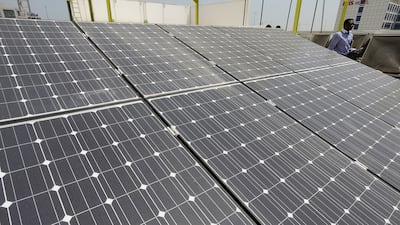The Dubai Supreme Council of Energy (DSCE) launched the Circular Economy Committee, which will bring public and private entities together and develop actionable initiatives to boost current applications and introduce best international practices.
A circular economy is an economic system that focuses on reducing the extraction of natural resources, minimising waste and regenerate natural systems. Raw materials, components and products keep their value for as long as possible, while renewable energy sources are used in a circular economy.
Last week, the UAE unveiled a strategic net-zero initiative that aims to reduce carbon emissions by 2050. The country will invest Dh600 billion ($163bn) in clean and renewable energy sources in the next three decades.
“The UAE attaches great importance to achieving sustainable and effective use of natural resources by transitioning to a green economy and increasing the share of clean and renewable energy sources,” Saeed Mohammed Al Tayer, vice chairman of the DSCE, said via state news agency Wam.
“The UAE Circular Economy Policy identifies the country’s priorities in terms of a circular economy. Priorities include infrastructure, sustainable transportation, manufacturing, food production and consumption,”
Last year, Dubai prioritised the circular economy in response to the Covid-19 pandemic, which upended the global economy. The emirate is looking to optimise available resources and minimise waste, Sami Al Qamzi, director general Dubai Economy, said earlier.
The committee aims to encourage investment in the circular economy and propose viable suggestions that support the upscaling of current applications and best international practices, Mr Al Tayer said. This achieves economic growth, while protecting the environment and ensuring the sustainability of natural resources.
“We aim to develop and launch innovative tools and initiatives in collaboration with our strategic partners to promote the adoption of the circular economy model across different sectors and ensure its application according to methodologies that link all effective players,” Mr Al Tayer said.
“We also strive to support start-ups and develop the capabilities of entrepreneurs in this vital sector in addition to encouraging the utilisation of modern technologies capabilities by enhancing the efficiency of natural resources and promoting sustainable practices to reuse resources, reduce waste, limit carbon emissions, and build a better future for generations to come.”
vice chairman of the Dubai Supreme Council of Energy
Ahmad Buti Al Muhairbi, secretary general of the DSCE and chairman of the Energy Demand Side Management Executive Committee, chaired the Circular Economy Committee's first meeting.
The committee's members include representatives from the Dubai Electricity and Water Authority, Dubai Municipality, Dubai Economy, Dubai Science Park, Emaar Properties and Diamond Developers.
“We are pleased with the response to suggestions discussed in the first meeting of the Circular Economy Committee. We already see several excellent examples of circularity that can be scaled up across Dubai,” Mr Al Muhairbi said.
“The committee discussed the report on the State of Circular Economy that was reviewed and aligned with the UAE Circular Economy Policy. The committee discussed some examples of global best practices, with next steps in developing initiatives and tools to support further the circular economy across different sectors in Dubai.”

